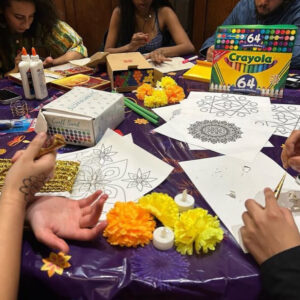By Utshaa Basu ’25

Diwali, also known as Deepavali, is a five day-long festival celebrated between October and November every fall. It commemorates the victory of light over darkness, and relates to the tale of Lord Ram returning to Ayodhya after his exile and defeat of the demon king, Ravana. In celebration of his return, the subjects of Ayodhya decorated the kingdom with diyas (small earthen lamplight candles) and set off firecrackers, affording Diwali the title: “Festival of Lights.”1 Coincidentally, Navaratri is a festival dedicated to Durga Ma and Goddess Parvati. During the festival, which lasts for nine days, various forms of the Devi, or the Divine Feminine, are worshiped. It concludes with Dussehra on the tenth day. Navratri is celebrated differently in regions of India, and garba is often performed in celebration, especially in Gujarat.2
This year, the South Asian Student Association (SASA) collaborated with Campus Activities to host a Diwali and Garba Dance Night at Bemis. Garba was added to the list of festivities this year due to the popular demand and overlapping dates. The event also featured free dinner, diya painting, a henna stand, polaroid photos, dandiya decoration and more.
The decorations lived up to the festival’s title, featuring gold and red tablecloths lit with diyas, an intricate balloon arch as the backdrop for the photographs, and tables scattered with craft supplies and assortments of shiny stones,ribbons, and rhinestones. The event was entirely student run, down to the arrangement of the arch. According to SASA co-chair Mahnoor Rehman ‘24, the most challenging part is the “logistics”. Co-chair George Jogi marvels at the increased collaborative spirit this year, mentioning that it was great to organize the event with a lot more SASA members jumping in to help.
The inclusion of garba was a standout this year. Not only is garba an effective communal dance, where dancers move in a circle, but the repetitive movements, increasing speed, and rhythmic beats can cause garba to be a meditative experience. We led the garba event by teaching participants some simple dance moves using dandiya sticks. Dandiya sticks are often used in garba and Navratri, representing the sword used by Durga Ma or the Divine Feminine during battle.3 Then we led them in a traditional garba circle, consisting of simple, repeated motions involving clapping and turning with gradually increasing speed. By the end of the event, we felt as though we were soaring, both on our feet and on the adrenaline pumping through our systems. Prior to the event, we were concerned about the gap in teaching non-South Asian students garba, as people are often intimidated to experiment. We were genuinely touched to find a huge number of attendees excited to take part in learning garba and immersing themselves in this aspect of Indian culture without any prior experience. Furthermore, I believe that the communal nature of garba also makes it more approachable and generates a strong feeling of connectivity with the group and collective.
Events like Diwali become all the more essential in a PWI (Predominantly White Institution) like CC, where there is limited education and representation of minority groups. Genuine authentic representation and collective celebration of ethnic culture can help BIPOC (Black, Indigenous, and People of Color) and multicultural students sustain and thrive in homogeneous environments. “I loved getting to dress up and celebrate a holiday that’s so close to my heart while being so far from home,” says Kaviya Barathi Chidambaram ‘27 when asked about their first Diwali celebration on the CC campus. They expand on what made the event special: “It was an incredible opportunity to share the experience with my friends, eat good food, dance, and even try doing henna– I think I’ll leave that to the experts!”
- TIMESOFINDIA.COM / Updated: Nov 8, 2023. “When in Diwali in 2023? History, Significance, Importance, Story and All You Need to Know – Times of India.” The Times of India, TOI, timesofindia.indiatimes.com/life-style/events/when-in-diwali-in-2019-history-significance-importance-story-and-all-you-need-to-know/articleshow/71723775.cms
- Britannica, The Editors of Encyclopaedia. “Navratri”. Encyclopedia Britannica, 11 Dec. 2023, https://www.britannica.com/topic/Navratri. Accessed 12 December 2023.
- Sindianeagle. “Importance of Dandiya Ras & Garba in Navratri Celebrations.” Travel to India, Cheap Flights to India, Aviation News, India Travel Tips, 31 Aug. 2016, www.indianeagle.com/travelbeats/navratri-9-days-of-dandiya-ras-and-garba/.